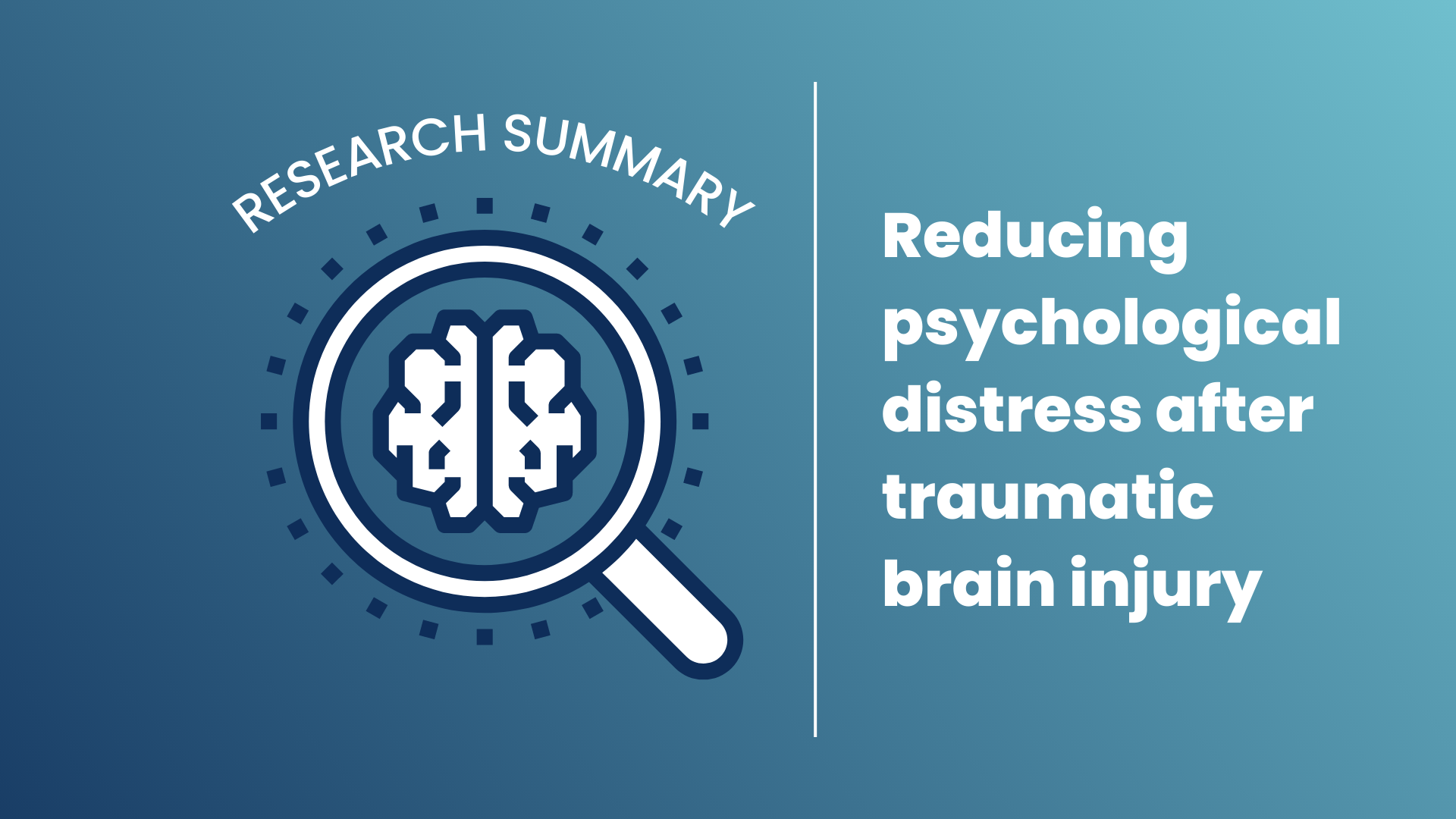What do we already know?
Anxiety and depression are common after traumatic brain injury (TBI)
Psychological distress refers to unpleasant feelings or emotions that you may have when you feel overwhelmed
- Contributed to by depression, anxiety, and somatization (excessive thoughts, feelings & behaviours relating to physical symptoms)
Psychotherapy has been proven to reduce psychological distress in a variety of groups
- We need more research on what approaches/types of therapy are most helpful for persons living with brain injury
Acceptance and Commitment Therapy (ACT)
- ACT is a psychotherapy derived from Cognitive Behavioural Therapy (CBT)
- CBT focuses on altering unhelpful thoughts, whereas ACT focuses on accepting one’s thoughts & feelings, without judgement, and committing to behaviours in line with one’s personal values
- In non-brain injured populations, ACT has been shown to reduce psychological distress
- Want to learn more about ACT? We recommend the book The Happiness Trap by Russ Harris
Preliminary research suggests ACT may be useful in treating psychological distress in persons with TBI
What did they want to know?
The research team wanted to know if an 8-week Acceptance and Commitment Therapy treatment intervention would reduce psychological distress in persons living with TBI
What did they do?
8-week randomized controlled trial (RCT) of ACT in persons with TBI in the chronic phase (≥ 6 months) after injury
RCT = Participants randomly assigned to a treatment group or control group
- Treatment group: 8 weeks of ACT (1.5 hour sessions)
- Control group: 8 weeks of usual care
- Only thing that differs between groups is the treatment (ACT in this study) – allows them to measure impact of ACT
To measure change, both groups answered psychological questionnaires at the beginning, the end of 8 weeks, and 3 months later
Psychological distress
- Measured with Global Severity Index (GSI) from Brief Symptom Inventory (BSI 18) with questions about depression, anxiety, and somatization
- Higher scores = greater psychological distress
They also measured:
- Acceptance
- Psychological flexibility
- Community participation
- Current and past psychiatric disorders (using the Mini International Neuropsychiatric Interview)
What did they find?
93 participants
- Primarily male, majority Black or Hispanic, on average 4-5 years post-injury, and most met DSM-IV criteria for a depressive disorder at beginning of study
Psychological distress
- ACT group showed greater reduction in psychological distress (vs. control group) at end of 8 weeks
- Specifically, reductions in anxiety and somatization were observed (no difference in depression between groups)
- The reduction in overall psychological distress was sustained 3 months later (i.e., treatment has lasting effects)
- More people in ACT treatment group had psychological distress scores drop to non-clinical levels of distress – this means ACT treatment had a clinically meaningful impact)
Other measures:
- ACT group showed greater scores on acceptance and action measures (this difference sustained 3 months later as well)
- No difference between groups on community participation
What does this mean?
ACT is helpful in reducing psychological distress in persons with mild, moderate, or severe TBI in the chronic phase post-injury
- Benefits are maintained 3 months after the treatment
- ACT also helps improve psychological flexibility and committed action towards values-based goals
- No difference found in community participation may mean actions toward value goals are small steps that accumulate over time to achieve larger participation goals (may take longer time to see impact)
Psychotherapies can be enhanced for persons with TBI by using modifications that align with their strengths and limitations
- E.g., use of written materials, brief summary phrases, visual and concrete/motor representations of metaphors, repetition, use of reminders & checklists
Need more research on:
- Most effective delivery/format of ACT (individual vs. group setting, part of larger rehab program, length of treatment)
- Comparison of ACT to other psychotherapies like CBT for persons with TBI
Source:
Sander, A. M., Clark, A. N., Arciniegas, D. B., Tran, K., Leon-Novelo, L., Ngan, E., … & Walser, R. (2021). A randomized controlled trial of acceptance and commitment therapy for psychological distress among persons with traumatic brain injury. Neuropsychological Rehabilitation, 31(7), 1105-1129.
doi: 10.1080/09602011.2020.1762670
Every week we summarize a recently published research study to give you current, evidence-based brain injury information.



